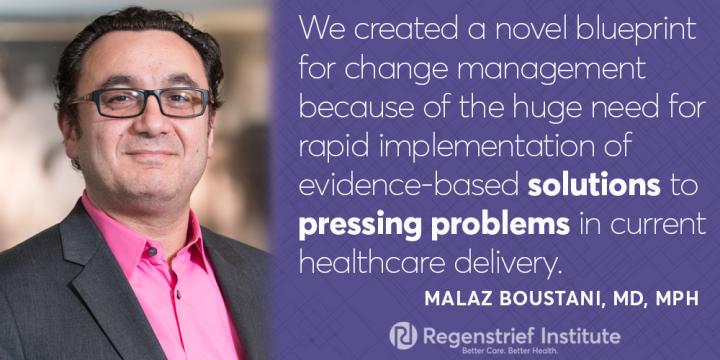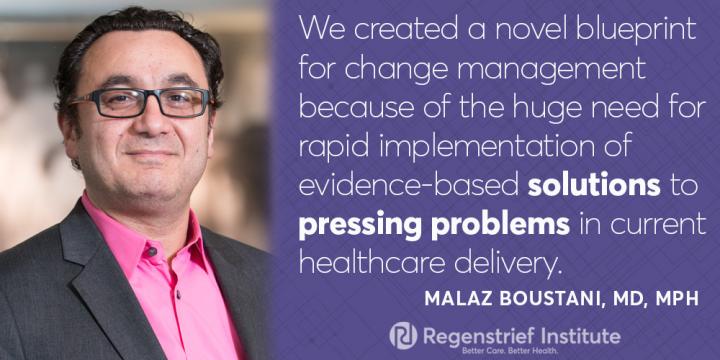
Credit: Regenstrief Institute
INDIANAPOLIS – A new study has found that Agile Implementation, an easy to localize and apply change methodology that enables fast, efficient, effective, scalable and sustainable implementation of evidence-based healthcare solutions, reduced central-line associated blood stream infections by a striking 30 percent. Central line-associated bloodstream infections are among the most common hospital-acquired infections and can have serious consequences including death.
"We borrowed Agile Implementation from the world of software development and created a novel blueprint for change management in healthcare because we see a huge need for rapid implementation of evidence-based solutions to pressing problems in current healthcare delivery," said Regenstrief Institute and Indiana University Center for Aging Research scientist Malaz Boustani, M.D., M.P.H., senior author of the new study and the founding director of the Center for Health Innovation and Implementation Science at Regenstrief Institute. The center is a partnership of the Regenstrief Institute with the Indiana Clinical and Translational Sciences Institute and IU School of Medicine.
"Our focus in this study is hospital acquired infection, but the Agile Implementation methodology provides a universal platform to implement evidence-based innovation in any environment in which humans are the major players," Dr. Boustani said. "It can be successfully employed in finance, manufacturing, technology or a dozen other fields as well as in health care."
The U.S. Centers for Disease Control and Prevention estimates that there are approximately 80,000 central line-associated bloodstream infections cases in the U.S. annually with costs estimated to range as high as $2 billion per year.
The study "Using the Agile Implementation Model to Reduce Central Line-associated Blood Stream Infections" will be published in an upcoming print issue of the American Journal of Infection Control. The work was supported by the Indiana Clinical and Translational Sciences Institute.
The impressive 30 percent reduction in central-line blood stream infections, as well as decreased rates of Clostridium difficile (commonly called C.difficile) infections were attained at two urban hospitals with the application of the eight steps of Agile Implementation. The C.difficile bacterium causes a serious form of colitis. It can produce diarrhea as well as more serious symptoms and surgical wound infections.
"Agile Implementation enables us to effectively implement existing evidence but it's not assembly line quality improvement, we aren't trying to put a square peg into a round hole," said study first author Jose Azar, M.D., IU Health medical director for quality and safety of academic medical centers and a co-founder of the Center for Health Innovation and Implementation Science. "As we went through the eight steps of Agile Implementation, we spent a lot of time involving all the players – doctors, nurses and other clinicians as well as infection control specialists – so they came to realize that the problem, in this case central-line blood stream infection, is a problem they want to be a part of solving. Engagement, rapidly discarding what doesn't work, and moving on to other possible solutions, are key to the process.
"We saw a genuine shift in the culture regarding patient safety events," said Dr. Azar. "The punitive attitude toward these types of events that existed before Agile Implementation evolved into an environment focused on shared learning and collaboratively improving care quality."
Using feedback from participants, Agile Implementation focuses on selecting the best evidence-based solutions to implement in a given situation and on how to implement these solutions to provide the best care possible. Three questions are posed: 1) What do we do that works well? 2) What does not work well? 3) What do we plan to do differently based on what we have learned?
"Accountability engages people incredibly," said Dr. Azar. "Agile Implementation directs us to investigate existing evidence-based solutions and let everyone know that we won't waste time on partially effective practices. We won't give up until we accomplish what we set out to do – find a solution that works and is sustainable for our environment."
"There may be a lot of existing evidence about solving problems and providing the best care, but that's not the issue," said Dr. Boustani. "What has been missing is how to determine the best solution for the problem in a specific place, how to implement it – with the word implement being underlined – and how to continually monitor the solution."
"We have shown that for aging brain care, ICU survivorship and now hospital acquired infection, Agile Implementation can make a major and rapid contribution to improving quality and it can be done at any hospital, anywhere," Dr. Boustani said. "We are transforming healthcare from 1.0 to 2.0 where we can provide better health, lower cost, and delightful patient and provider experiences."
###
Authors of the new study in addition to Regenstrief Institute investigator Malaz Boustani, who is also the Richard M. Fairbanks Professor of Aging Research at IU School of Medicine, and Dr. Azar are Kristen Kelley, M.P.H.; Jennifer Dunscomb, M.S.N., R.N.; Anthony Perkins, M.S.; Yun Wang, M.D.; Cole Beeler, M.D.; Lana Dbeibo, M.D.; Douglas Webb, M.D.; Larry Stevens, M.D.; Mark Luetkemeyer, M.D.; Areeba Kara, M.D., MS; Ryan Nagy, M.D. and Craig A. Solid, Ph.D.
Media Contact
Cindy Fox Aisen
[email protected]
317-843-2275
@regenstrief




